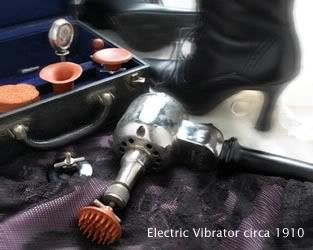
Bay Area filmmakers Wendy Slick and Emiko Omori never imagined that it would take more than seven years to make a documentary about one electrical appliance. They were wrong.
Their subject was the history of vibrators.
"Passion & Power: The Technology of Orgasm" premieres at Lincoln Center in New York on Saturday and will be screened at the Mill Valley Film Festival in October. The cast of characters includes two feminist pioneers, a homemaker arrested for selling vibrators at Tupperware-like parties in Texas and Rachel Maines, a scholar who in 1977 stumbled upon turn-of-the-century ads for the device while researching needlework patterns.
"The vibrator was contemporaneous with the toaster and before the steam iron and vacuum cleaner," Maines said in a phone interview. "We had our priorities right."
Slick and Omori make it clear that these instruments of pleasure were more than a sexual tool -- they were political, social and subversive as well.
The filmmakers were particularly startled by the relationship between doctors and vibrators. Maines wrote that gynecological massage had been a standard medical treatment for "hysteria" -- viewed as the womb's response to sexual deprivation -- since antiquity. In the 1860s, an American physician created the Manipulator, a steam-powered device. Two decades later, Dr. Mortimer Granville of Britain invented the electromechanical vibrator, though he intended it solely for male skeletal muscles and warned that it would be morally indefensible to use it on women. Some of his colleagues thought otherwise. It could take more than an hour of manual labor to induce the "hysterical paroxysm," as it was called. With the aid of the vibrator, this could more profitably be achieved in less than 10 minutes.
"When you think of people producing orgasm for payment, the word that leaps to mind is not doctors," Maines said during the phone interview.
The filmmakers said it was inspiring to get to know Dodson and Williams, who opened Eve's Garden, a store in Manhattan for women's sex toys, in the early 1970s. At the same time, Slick said, it was reassuring to learn that these icons had plenty of insecurities -- such as when Dodson confesses in the film that she used to think she was deformed because she had "elongated inner lips."
The documentary includes other women who haven't played by the rules, as Slick put it. Performance artist Reno reveals how she discovered at a young age the pleasures that bathtub fixtures could provide. Texas housewife Joanne Webb recounts her arrest in 2004 for selling vibrators -- in her state, a felony offense. Lawyer BeAnn Sisemore talks about defending Webb, whose life fell apart as a result of the case.
The documentary itself, much like early vibrator ads, is tasteful yet provocative.
"We're too risque for PBS but not enough for HBO," Omori said.
To risque for PBS gives them an A+ in my book...as does anything that involves the amazing Betty Dodson.
Essin' Em
Check out the rest of this really interesting article about this film








No comments:
Post a Comment